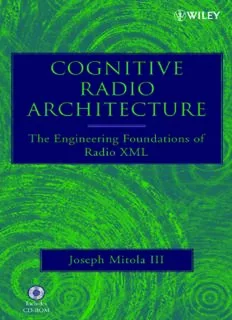
Cognitive radio architecture PDF
Preview Cognitive radio architecture
COGNITIVE RADIO ARCHITECTURE The Engineering Foundations of Radio XML JOSEPH MITOLA III A JOHN WILEY & SONS, INC., PUBLICATION COGNITIVE RADIO ARCHITECTURE COGNITIVE RADIO ARCHITECTURE The Engineering Foundations of Radio XML JOSEPH MITOLA III A JOHN WILEY & SONS, INC., PUBLICATION This book is printed on acid-free paper. Copyright © 2006 by John Wiley & Sons, Inc. All rights reserved. Published by John Wiley & Sons, Inc., Hoboken, New Jersey. Published simultaneously in Canada. No part of this publication may be reproduced, stored in a retrieval system, or transmitted in any form or by any means, electronic, mechanical, photocopying, recording, scanning, or otherwise, except as permitted under Section 107 or 108 of the 1976 United States Copyright Act, without either the prior written permission of the Publisher, or authorization through payment of the appropriate per-copy fee to the Copyright Clearance Center, Inc., 222 Rosewood Drive, Danvers, MA 01923, 978-750-8400, fax 978-646-8600, or on the web at www.copyright.com. Requests to the Publisher for permission should be addressed to the Permissions Department, John Wiley & Sons, Inc., 111 River Street, Hoboken, NJ 07030, (201) 748-6011, fax (201) 748-6008. Limit of Liability/Disclaimer of Warranty: While the publisher and author have used their best efforts in preparing this book, they make no representations or warranties with respect to the accuracy or completeness of the contents of this book and specifi cally disclaim any implied warranties of merchantability or fi tness for a particular purpose. No warranty may be created or extended by sales representatives or written sales materials. The advice and strategies contained herein may not be suitable for your situation. You should consult with a professional where appropriate. Neither the publisher nor author shall be liable for any loss of profi t or any other commercial damages, including but not limited to special, incidental, consequential, or other damages. For general information on our other products and services please contact our Customer Care Department within the U.S. at 877-762-2974, outside the U.S. at 317-572-3993 or fax 317-572-4002. Wiley also publishes its books in a variety of electronic formats. Some content that appears in print, however, may not be available in electronic format. Library of Congress Cataloging-in-Publication Data: Mitola, Joseph. Cognitive radio architecture : the engineering foundations of radio XML / by Joseph Mitola. p. cm. Includes bibliographical references and index. ISBN-10: 0-471-74244-9 ISBN-13: 978-0-471-74244-9 1. Software radio. 2. XML (Document markup language) I. Title. TK5103.4875.M58 2006 621.384–dc22 2005051362 Printed in the United States of America 10 9 8 7 6 5 4 3 2 1 CONTENTS PREFACE ix ACKNOWLEDGMENTS xi 1 INTRODUCTION 1 1.1 Perception / 3 1.2 Aware, Adaptive, or Cognitive? / 5 1.3 Adaptation / 8 1.4 Cognition / 10 1.5 Cognitive Radio and Public Policy / 15 1.6 Are We There Yet? / 16 1.7 Key Questions / 18 1.8 Organization of the Text / 19 1.9 Exercises / 20 I FOUNDATIONS 2 TECHNICAL OVERVIEW 25 2.1 The iCR Has Seven Capabilities / 25 2.2 Sensing and Perception: What and Whom to Perceive / 27 2.3 Ideal Cognitive Radio (iCR) Platform Evolution / 41 2.4 The serModel of Machine Learning for iCR / 47 2.5 Architecture / 51 v vi CONTENTS 2.6 Synoptic iCR Functional Defi nition / 56 2.7 Exercises / 56 3 EVOLVING FROM AWARE AND ADAPTIVE TO COGNITIVE RADIO 58 3.1 Revolution or Evolution? / 58 3.2 Moving Day / 59 3.3 Developing AML for Genie / 62 3.4 Learning Etiquette / 73 3.5 Value Proposition for AML in AACR / 75 3.6 Exercises / 79 4 AUTONOMOUS MACHINE LEARNING FOR AACR 80 4.1 Machine Learning Framework / 80 4.2 Histogram as a Discovery Algorithm / 85 4.3 User-Domain Learning / 88 4.4 Radio-Domain Learning / 97 4.5 Reinforcement, Extension, and Constraint Discovery / 108 4.6 Learning Strategies / 118 4.7 Exercises / 121 5 COGNITIVE RADIO ARCHITECTURE 123 5.1 CRA I: Functions, Components, and Design Rules / 124 5.2 CRA II: The Cognition Cycle / 134 5.3 CRA III: The Inference Hierarchy / 138 5.4 CRA IV: Architecture Maps / 143 5.5 CRA V: Building the CRA on SDR Architectures / 144 5.6 Cognition Architecture Research Topics / 152 5.7 Exercises / 152 II RADIO-DOMAIN COMPETENCE 6 RADIO-DOMAIN USE CASES 157 6.1 Radio Use-Case Metrics / 157 6.2 FCC Unused TV Spectrum Use Case / 163 6.3 Demand Shaping Use Case / 170 6.4 Military Market Segment Use Cases / 176 CONTENTS vii 6.5 RF Knowledge That Saves Lives / 177 6.6 Prognostication / 180 6.7 Exercises / 180 7 RADIO KNOWLEDGE 183 7.1 Radio-Domain Overview / 183 7.2 Knowledge of the HF Radio Band / 195 7.3 Knowledge of the LVHF Radio Band / 208 7.4 Radio Noise and Interference / 224 7.5 Knowledge of the VHF Radio Band / 228 7.6 Knowledge of the UHF Radio Band / 237 7.7 Knowledge of the SHF Radio Band / 246 7.8 Knowledge of EHF, Terahertz, and Free Space Optics / 256 7.9 Satellite Communications Knowledge / 260 7.10 Cross-Band/Mode Knowledge / 267 8 IMPLEMENTING RADIO-DOMAIN SKILLS 275 8.1 Cognitive Radio Architecture Structures Radio Skills / 276 8.2 Embedded Databases Enable Skills / 281 8.3 Production Systems Enable Skills / 288 8.4 Embedded Inference Enables Skills / 291 8.5 Radio Knowledge Objects (RKOs) / 296 8.6 Evolving Skills Via RKO and RDH / 303 8.7 Implementing Spatial Skills / 305 8.8 Generalized <Information-landscape/> / 318 8.9 Microworlds / 323 8.10 Radio Skills Conclusions / 325 8.11 Exercises / 326 III USER-DOMAIN COMPETENCE 9 USER-DOMAIN USE CASES 331 9.1 Emergency Companion Use Case / 331 9.2 Offi ce Assistant Use Case / 333 9.3 Cognitive Assistants for Wireless / 334 9.4 User Skill Enhancements / 343 9.5 Exercises / 346
Description: